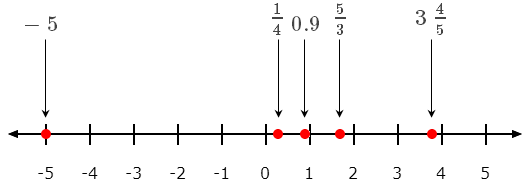Locate, Compare, & Order
6th Grade
|
|
|
Alabama Course of Study Standards:
10.b, 11.d
|
Use rational numbers in real-world and mathematical situations, explaining the meaning of 0 in each situation.
Solve real-world and mathematical problems by graphing points in all four quadrants of the coordinate plane,
including finding distances between points with the same first or second coordinate. |
Arizona Academic Standards:
6.NS.C.6c
Common Core State Standards:
Math.6.NS.6c or 6.NS.C.6.C
Kentucky Academic Standards (KAS):
6.NS.6.c
Mississippi College- and Career-Readiness Standards:
6.NS.6c
North Carolina - Standard Course of Study:
6.NS.6.c
|
Find and position integers and other rational numbers on a
horizontal or vertical number line diagram; find and position pairs
of integers and other rational numbers on a coordinate plane. |
New York State Next Generation Learning Standards:
6.NS.6.c
|
Find and position integers and other rational numbers on a horizontal or vertical number line. Find and position pairs of integers and other rational numbers on a coordinate plane. |
Tennessee Academic Standards:
6.NS.C.6.c
|
Find and position integers and other rational numbers on a horizontal or vertical number line diagram; find and position pairs of integers and other rational numbers on a coordinate plane. |
Arizona Academic Standards:
6.NS.C.7a
|
Interpret statements of inequality as statements about the relative position of two numbers on a number line. |
Common Core State Standards:
Math.6.NS.7a or 6.NS.C.7.A
Kentucky Academic Standards (KAS):
6.NS.7.a
Mississippi College- and Career-Readiness Standards:
6.NS.7a
|
Interpret statements of inequality as statements about the relative
position of two numbers on a number line diagram. For example,
interpret –3 > –7 as a statement that –3 is located to the right of –7 on
a number line oriented from left to right. |
Georgia Math and ELA Standards:
6.NR.3.3
|
Recognize and explain that opposite signs of integers indicate locations on opposite sides of zero on the number line; recognize and explain that the opposite of the opposite of a number is the number itself. |
North Carolina - Standard Course of Study:
6.NS.7.a
|
Interpret statements of inequality as statements about the relative position of two numbers on a number line diagram. |
New York State Next Generation Learning Standards:
6.NS.7.a
|
Interpret statements of inequality as statements about the relative position of two numbers on a number line.
e.g., Interpret –3 > –7 as a statement that –3 is located to the right of –7 on a number line oriented from left to right. |
Tennessee Academic Standards:
6.NS.C.7.a
|
Interpret statements of inequality as statements about the relative position of two numbers on a number line diagram. For example, interpret -3 > -7 as a statement that -3 is located to the right of -7 on a number line oriented from left to right. |
Wisconsin Academic Standards:
6.NS.C.7.a
|
Interpret statements of inequality as statements about the relative position of two numbers on a number line.
For example, interpret -3 > -7 as a statement that -3 is located to the right of -7 on a number line oriented from left to right. |
Arizona Academic Standards:
6.NS.C.7b
|
Write, interpret, and explain statements of order for rational numbers in real-world context. |
Common Core State Standards:
Math.6.NS.7b or 6.NS.C.7.B
Kentucky Academic Standards (KAS):
6.NS.7.b
Mississippi College- and Career-Readiness Standards:
6.NS.7b
|
Write, interpret, and explain statements of order for rational numbers in real-world contexts. For example, write –3 °C > –7 °C to
express the fact that –3 °C is warmer than –7 °C. |
Georgia Math and ELA Standards:
6.NR.3.4
|
Write, interpret, and explain statements of order for rational numbers in authentic, mathematical situations. Compare rational numbers, including integers, using equality and inequality symbols. |
North Carolina - Standard Course of Study:
6.NS.7.b
|
Write, interpret, and explain statements of order for rational numbers in real-world contexts. |
New York State Next Generation Learning Standards:
6.NS.7.b
|
Write, interpret, and explain statements of order for rational numbers in real-world contexts.
e.g., Write –3°C > –7°C to express the fact that –3°C is warmer than –7°C. |
Tennessee Academic Standards:
6.NS.C.7.b
|
Write, interpret, and explain statements of order for rational numbers in real-world contexts. For example, write -3 °C > -7 °C to express the fact that -3 °C is warmer than -7 °C. |
Wisconsin Academic Standards:
6.NS.C.7.b
|
Write, interpret, and explain statements of order for rational numbers in real-world contexts.
For example, write -3 °C > -7 ° to express the fact that -3 ° is warmer than -7 °. |
Pennsylvania Core Standards:
CC.2.1.6.E.4
|
Apply and extend previous understandings of numbers to thesystem of rational numbers. |
Pennsylvania Core Standards:
M06.A-N.3.2.1
|
Write, interpret, and explain statements of order for rational numbers in real-world contexts. |
Georgia Math and ELA Standards:
6.NR.3.2
|
Order and plot integers
on a number line and use
distance from zero to
discover the connection
between integers and
their opposites. |
Georgia Math and ELA Standards:
6.NR.3.4
|
Write, interpret, and
explain statements of
order for rational
numbers in authentic, mathematical situations.
Compare rational
numbers, including
integers, using equality
and inequality symbols. |
Georgia Math and ELA Standards:
6.PAR.8.1
|
Locate and position rational numbers on a
horizontal or vertical number line; find and
position pairs of integers and other rational
numbers on a coordinate plane. |
Arkansas Academic Standards:
6.NCC.2
|
Find and plot rational numbers on horizontal and vertical number lines in real-world and mathematical problems. |
Arkansas Academic Standards:
6.NCC.3
|
Compare rational numbers, using inequalities (<, >, ≤, ≥, ≠) and order on a number line. |
|
|


 6th Grade Math - Locate, Compare, & Order Lesson
6th Grade Math - Locate, Compare, & Order Lesson





